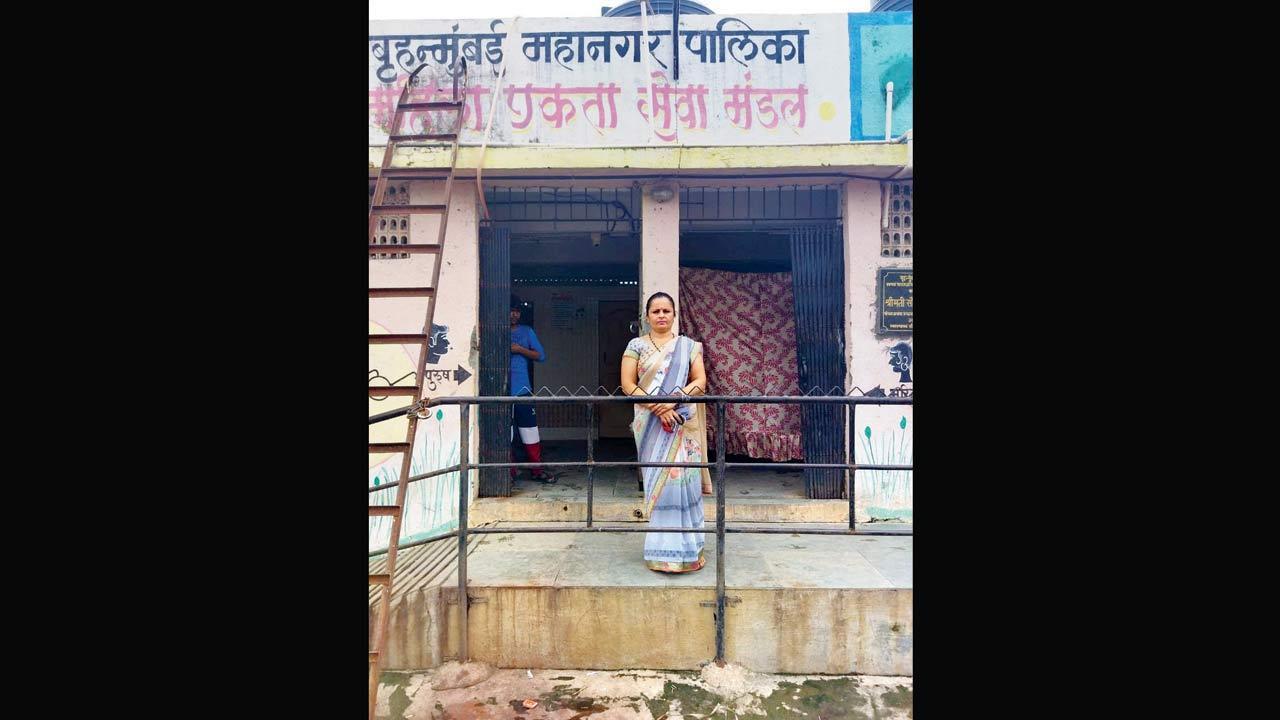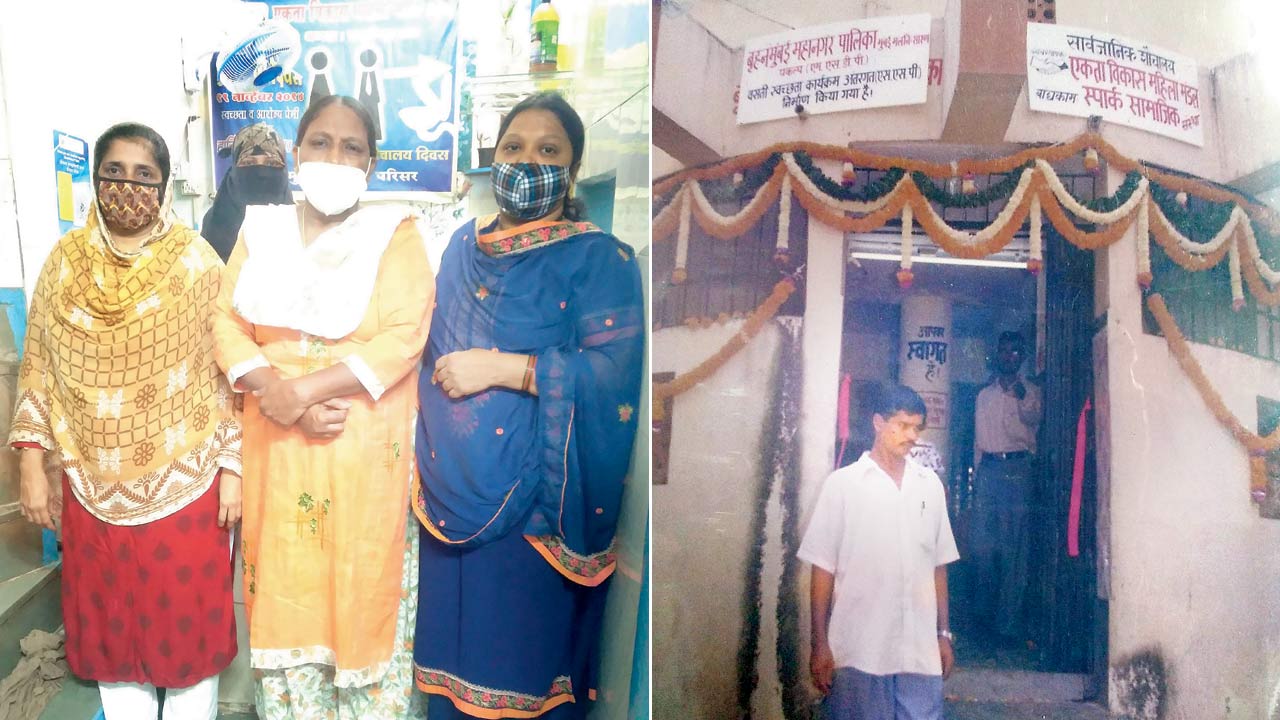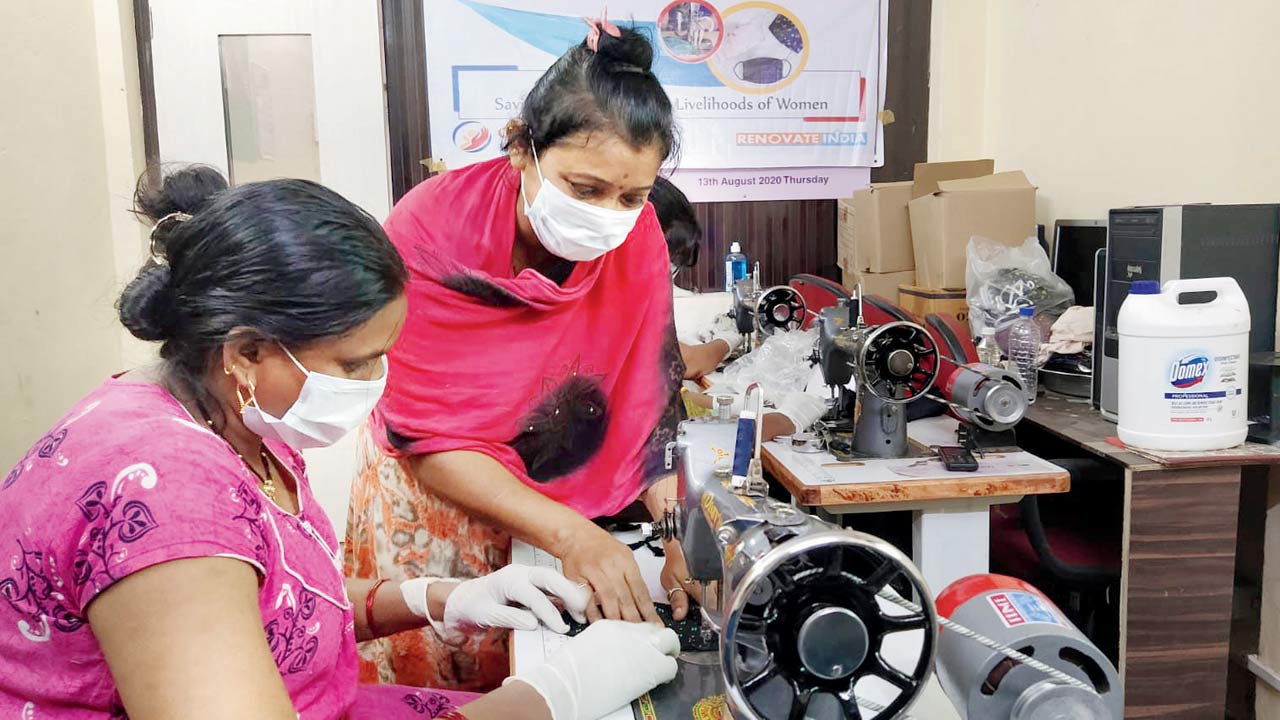Women running the city’s community toilets suffer political pressure, physical assault and vulnerability they didn’t sign up for

Mahila Ekta Seva Mandal president Anita Mishra is the caretaker of a block of 15 toilet seats used by thousand-odd dwellers in a transit camp in Wadala
![]() Anita Mishra, 41, has been a Mumbai resident since 1997—it’s the same year that she married and relocated from a village near Varanasi. After living in a rented home in Sion, her husband and two children shifted to the Kokari Agar Mhada Transit Camp, Wadala in 2005. Life progressed in a 10 by 12 ft kholi. Mishra worked as a junior artiste in films, while her husband found a job in an insurance agency; her children eventually chose their calling. But the year 2019 brought about a refreshing change—Mishra took the lead in forming the Mahila Ekta Seva Mandal, the community-based organisation, which signed a memorandum with the city’s municipal corporation for the construction of a toilet. As per the requirement of BMC’s Slum Sanitation Programme (SSP), Mishra and other women of her F North vicinity would not just be the users of the toilet, they would also maintain it collaboratively. Mishra would be taught the paperwork and organisation building by local NGOs and the BMC’s officer on special duty (OSD). A clean toilet maintained by women would contribute to the making of Swachh Bharat.
Anita Mishra, 41, has been a Mumbai resident since 1997—it’s the same year that she married and relocated from a village near Varanasi. After living in a rented home in Sion, her husband and two children shifted to the Kokari Agar Mhada Transit Camp, Wadala in 2005. Life progressed in a 10 by 12 ft kholi. Mishra worked as a junior artiste in films, while her husband found a job in an insurance agency; her children eventually chose their calling. But the year 2019 brought about a refreshing change—Mishra took the lead in forming the Mahila Ekta Seva Mandal, the community-based organisation, which signed a memorandum with the city’s municipal corporation for the construction of a toilet. As per the requirement of BMC’s Slum Sanitation Programme (SSP), Mishra and other women of her F North vicinity would not just be the users of the toilet, they would also maintain it collaboratively. Mishra would be taught the paperwork and organisation building by local NGOs and the BMC’s officer on special duty (OSD). A clean toilet maintained by women would contribute to the making of Swachh Bharat.
ADVERTISEMENT
Mishra’s story, unfortunately, did not play out as scripted in the SSP, which largely leans on the framework provided by the World Bank. Since 2019, Mishra has been the harried caretaker of a block of 15 toilet seats used by thousand-odd dwellers. Each family unit pays R100 per month for the facility. From the first week, the pipes started choking. It was discovered soon that the contractor had not provided for any sewer outlet. Mishra has since borrowed a sewage connection from another toilet block, so as to avoid blockage. She has written to the municipal corporator, MLA and MP for help. She is still seeking assistance. Meanwhile, she has had minor and major disagreements with neighbours over payment and toilet upkeep; the CCTV cameras installed in the toilet block were damaged a while ago. At one point, her family members were also ostracised. She was labelled the “bhayyani from UP,” who had taken it upon herself to model community participation.
 Sharfunnisa Khan (centre) from Antop Hill, runs the Ekta Vikas Mahila Mandal toilet. She says local goons have been wanting to grab the space
Sharfunnisa Khan (centre) from Antop Hill, runs the Ekta Vikas Mahila Mandal toilet. She says local goons have been wanting to grab the space
Mishra is troubled by the petty politics. She had expected a healthy power shift in everyday living after taking over the toilet—a property otherwise dominated by men (some anti-social) of the slum area. It instead set off a chain of undesirable events. Mishra, however, continues to dream of making lives more livable by initiating a transition in toilet ownership. She is not going to give up control over a construction that has the potential of binding people for a good cause. She told this columnist of her vow to “fight till her last breath”.
Thirty women, including Mishra, have jotted down their on-ground lessons—failures and successes—in toilet management in a newly-released advocacy handbook brought out by CORO India, the NGO working for marginalised sections. The Marathi handbook (Mahila, Shauchalaye Aani Barach Kaahi) is directed at stakeholders of CORO’s Right To Pee movement launched in 2011. The movement stands on the shoulders of committed grassroots activists, who have travelled across the length and breadth of Mumbai’s slum localities—a population of 18,00,000 approximately—to oppose open defecation and instill the importance of safe and clean toilets. Unfortunately, though, the handbook lacks the visual reflection of the past RTP campaigns conducted by CORO and 35-odd other social groups to alert women to the dangers of holding back nature’s calls.
 Meena Kamble has been elected president of the city-wide Cleanliness Promotion Federation of all toilet-linked mandals. She was also instrumental in providing employment of women slum dwellers during the lockdown, especially to meet the popular demand of washable masks
Meena Kamble has been elected president of the city-wide Cleanliness Promotion Federation of all toilet-linked mandals. She was also instrumental in providing employment of women slum dwellers during the lockdown, especially to meet the popular demand of washable masks
Hopefully, CORO’s soon-to-be revised (English and Marathi) e-book evokes Mumbai’s toilet truths in a more evocative idiom. While showcasing the first-hand accounts of women toilet owners is a commendable task, the personal milestones need to come alive in tighter, better-edited narratives. The voices have the potential to awaken fellow slum dwellers, sanitation activists, BMC/government functionaries who are well-meaning, but not necessarily sensitive to the messy world of community toilet ownership. But CORO, which had once taken the lead in the RTP initiative, is expected to articulate the women’s voices effectively. Unless advocacy literature is equipped with persuasive storytelling and visual appeal, it doesn’t shake the corridors of power.
There are approximately 1,000-odd toilet blocks operated by community organisations in Mumbai, of which 200 have women caretakers. In COVID times, the management of these blocks is more difficult than usual. Sharfunnisa Khan, 59, in Sheikh Mirsi Dargah, Antop Hill, cannot afford a sweeper to clean the toilet, due to which she cleans it on her own. She barely collects a monthly sum of Rs 15,000 from the users, which is just about enough for meeting the electricity and water cess. At this point, many neighbourhood shanties have been demolished in her vicinity, due to which the toilet usage has decreased. That spells bad news for Khan, who has to stand guard at an underused facility. She lives in constant fear, as “local goons” have been wanting to grab the space. Khan runs sewing classes for neighbourhood women. She is a mother figure for many younger women in the locality. But she regrets the personal price she has paid in her bid to save her
Ekta Vikas Mahila Mandal toilet. “We, slum women, can only do so much to keep the toilet in our control. But we can’t afford powerful enemies!”
Meena Kamble, 40, head of the Savitribai Phule Mahila Mandal in Kamraj Nagar, Ghatkopar, identifies with Khan’s dilemma. “Thankfully, I am not the sort of person who gives up easily. But any lesser individual would have crumbled with the responsibility of a 52-seater mega toilet, which was built in a super-delayed period of four years.” Numerous contractors disowned the toilet site at critical junctures. The police once detained the mandal members due to a false complaint of unauthorised slum construction. As Kamble enumerates the perils in her journey, she also highlights the solutions she has been able to provide, so as to keep the facility in optimum use. Her leadership was recognised beyond her ward; she is the elected president of the city-wide Cleanliness Promotion Federation of all toilet-linked mandals. She was also instrumental in providing employment for slum women during the lockdown, especially to meet the popular demand of washable masks.
Kamble’s story rests on a positive note, and that’s because she enjoys her husband’s support. But, the CORO handbook has knotty cases of women who are discouraged by male family members to take on community work. They are also at the receiving end of acid attacks and violent confrontation with drug peddlers who treat toilets as safe havens.
Goregaon resident Kanta Ganeshan, 55, was attacked with swords by drug mafia; they threatened her to surrender her claim. Ganeshan and her daughters mustered courage and hit back at the assaulters with iron rods. Her physical daring and mental alertness drove away the miscreants. Ganeshan firmly holds the toilet keys at this point. She was once an active part of Shiv Sena, a fact she intelligently puts to good use for the toilet cause. She is known to reach the current Sena administration whenever her toilet environment is in danger. As BMC’s former officer OSD Anand Jagtap puts it: CORO rightly supports and lauds women like Ganeshan, who adapt to interesting leadership strategies. Very often it is advisable to work around the system, than to rebel against it. The women caretakers in fact have a good sense of when to do what.
Courage is the middle name of the women featured in the CORO handbook. These Mumbaikars march ahead; despite no help in sight. Without a government authority to take recourse to, the women toilet managers hold on to the larger truth—a safe, clean toilet is among the first steps towards a healthy life. It’s a basic right, for which they put up a ferocious fight.
Sumedha Raikar-Mhatre is a culture columnist in search of the sub-text. You can reach her at sumedha.raikar@mid-day.com
 Subscribe today by clicking the link and stay updated with the latest news!" Click here!
Subscribe today by clicking the link and stay updated with the latest news!" Click here!







